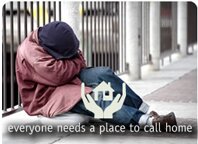For every homeless person in Canada,23 others are barely keeping a roof over their heads,according to a new study that paints a bleak picture of what it calls the country’s “hidden emergency.”
While there are 17,000 shelter beds available across Canada every night,as many as 400,000 men,women and children are living in inadequate,unsafe housing where rent alone eats up more than half of the household income,the study says.
The authors say the study documents for the first time that poorly housed Canadians experience the same severe health and security worries as people living on the street.
The numbers of people suffering the devastating health outcomes associated with inadequate housing could be “staggering”and go far beyond previous estimates based on shelter and street counts,the study says.
People who don’t have a healthy place to live — regardless of whether they are homeless or housed in substandard conditions — are at high risk of experiencing hunger,physical and mental health problems and hospitalization,the study says. They also have problems accessing needed health care.
“The real gulf in health outcomes doesn’t lie between people who are homeless and people who aren’t homeless,”it says. “It’s between those who have continued access to healthy housing and those who don’t.”
Stephen Hwang,a medical doctor and the lead researcher from the University of Toronto,called on the federal government to recognize the problem and develop “national housing standards that ensure universal,timely access to decent,stable and appropriate housing.”
The recommendation echoes one made earlier this week by an all-party Commons committee,which told the government an effective strategy to end poverty must include steps to guarantee an adequate supply of affordable housing.
The study,known as the Health and Housing in Transition Study,is tracking 1,200 single adults in Vancouver,Toronto and Ottawa over a period of two years. The findings released Friday were based on the first round of interviews after year one.
Regardless of whether those interviewed were poorly housed or homeless,the study found:
- Almost one in four said they had been beaten up or attacked in the past year.
- More than one in four,or 28 per cent,of people said they have lost a limb,have trouble walking or other mobility problems.
- More than half,52 per cent,reported a past diagnosis of mental health problems.
- Sixty-one per cent said they had a traumatic brain injury at some point in their lives.
- Thirty-three per cent reported having trouble getting enough to eat.
- Fifty-five per cent said they had visited an emergency department in the previous year.
The study,which relies in part on statistics in the 2006 census’housing series,is being conducted by an alliance of researcher partners,including universities in British Columbia,Alberta,Ontario and Quebec.
It defines the homeless as people who are couch surfing or living in shelters,on the street or some other place not meant for human habitation. People who had moved at least twice or been homeless in the previous year were defined as vulnerably housed.
BY NORMA GREENAWAY,POSTMEDIA NEWS NOVEMBER 19,2010, The Vancouver Sun
© Copyright (c) Postmedia News

